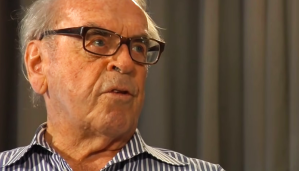
Tributes have been pouring in to eminent German theologian Jürgen Moltmann, 98, who died on June 3. Moltmann was Emeritus Professor of Systematic Theology at the University of Tübingen and considered one of the most widely read theologians in the latter half of the 20th century. His many academic books, such as Theology of Hope (1964) and Crucified God (1972) challenge the academic status quo.
From 1968 to 1983, Moltmann served as a member of the Commission on Faith and Order of the World Council of Churches (WCC).
The Rev. Prof. Dr Heinrich Bedford-Strohm, WCC moderator, said Moltmann had been a “great friend” of the WCC and the ecumenical movement. “Not only has the life of a great theologian now come to an end, but also the life of a great human being, a man with a wide heart. He is now experiencing the fullness of love of the kingdom of God, of which he wrote so much and which he himself radiated so much.”
Moltmann was born in Hamburg, Germany, on May 8, 1926. Called out of school to fight as a soldier aged 16, he witnessed the death of a friend in a bombing raid in the city. “That night was the first time I cried out to God,” he later wrote. “Why him? Why not me?”
Moltmann became a prisoner of war in 1945 and ended up at Kilmarnock in Scotland where he realized the abhorrent lies and evils of the Nazis, and experienced a loss of hope.
He began reading a copy of the New Testament given to him earlier at a POW (Prisoners of War) camp in Belgium. Then his life was transformed, as he later reflected in ‘A Broad Place: An Autobiography’ (2007).
“I read Mark's Gospel as a whole and came to the story of the passion: when I heard Jesus' death cry, 'My God, why have you forsaken me?' I felt growing within me the conviction: this is someone who understands you completely, who is with you in your cry to God and has felt the same forsakenness you are living in now. I began to understand the assailed, forsaken Christ because I knew that he understood me.”
“The divine brother in need, the companion on the way, who goes with you through this 'valley of the shadow of death', the fellow sufferer who carries you, with your suffering. I summoned up the courage to live again, and I was slowly but surely seized by a great hope for the resurrection into God's 'wide space where there is no more cramping.'”
Throughout his life, Moltmann’s theology evolved with this central theme of God suffering on the cross bringing hope to mankind. He returned to Germany and studied at the theology department in Göttingen, and his academic career flourished.
Croatian theologian Miroslav Volf, the founding director of the Yale Center for Faith & Culture at Yale Divinity School, paid tribute to Moltmann who oversaw his doctoral thesis and became a close friend and mentor. He pointed out that Moltmann had a great reach within the evangelical community, preaching for the Yoido Full Gospel Church in Seoul, South Korea and also the Crystal Cathedral in California.
Last April, Moltmann sent Volf a personal reflection about death, originally given at his 97th birthday and saying that every morning he found himself “amazed that I am still here.”
“To die means to let go. I am preparing myself for this,” wrote Moltmann. “To die means to give one’s life over to God. I am preparing myself for that, too. The raising to eternal life is my hope in life and in death. The eternal life will also be lived.
“This is the life of God’s new creation. Death is like a birthday to new life in God’s kingdom. Every morning of every new day that hope gives me new courage to live. But I did not invite you here to ponder things with me but to rejoice with me. Let us toast to life—here and there!”
“I mourn his passing,” said Volf in his tribute. “But perhaps his death is not just an occasion for mourning but for celebration as well: Let us toast to his life — here and there!”




